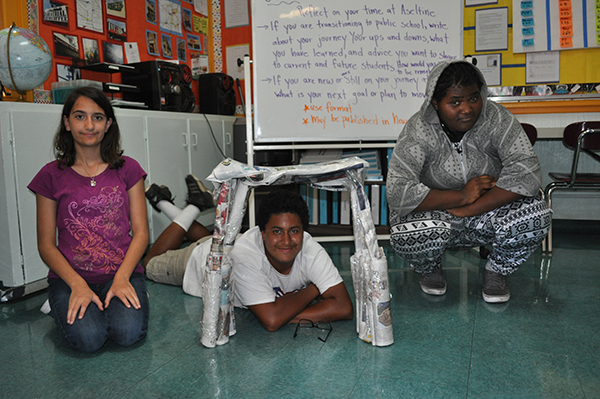Problem Solving:
In A seltine’s school wide problem-solving sessions, students receive a “problem” to “solve.” Although staff press students to ask questions throughout the process – encouraging students to approach the problem in a thoughtful, deliberate manner – how they go about solving the problem is entirely up to them. Unlike most labs – where students receive a list of steps to follow – students do not just complete tasks and follow instructions – they carefully consider the situation; develop a plan to address the problem, and then put their plan into action. This not only teaches them important scientific principles, it trains them to think like a scientist, giving them the opportunity to master problem-solving techniques, decision-making skills, and critical thinking – all while employing the scientific method.
seltine’s school wide problem-solving sessions, students receive a “problem” to “solve.” Although staff press students to ask questions throughout the process – encouraging students to approach the problem in a thoughtful, deliberate manner – how they go about solving the problem is entirely up to them. Unlike most labs – where students receive a list of steps to follow – students do not just complete tasks and follow instructions – they carefully consider the situation; develop a plan to address the problem, and then put their plan into action. This not only teaches them important scientific principles, it trains them to think like a scientist, giving them the opportunity to master problem-solving techniques, decision-making skills, and critical thinking – all while employing the scientific method.
Although these 2-4 hour activities are centered in science and enhance students’ knowledge of the subject, problem-solving is not just about science. The work students do during problem-solving also imparts strategies for critical thinking, appropriate decision-making, and team building skills, providing students with the tools they need to positively change their lives. In the process, students learn important organizational skills such as time and resource management, and many discover previously unexplored or unknown leadership skills.
Problem-solving sessions teach Aseltine students, who may struggle with controlling their emotions and behavior, to become thinkers and not reactors; to evaluate situations; to ask questions and take risks; to identify options; to decide which option is best to try in a given situation, and then to learn to apply a similar evaluation process in every day situations, including life outside Aseltine School. Most importantly, these sessions give these young people, who have not been able to succeed in any other education setting, a path along which they can begin learning how they learn.


